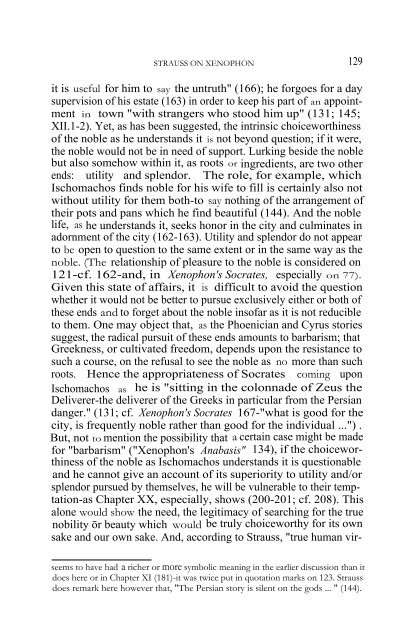Strauss on Xenophon's Socrates Xenophon's Socratic Discourse: An ...
Strauss on Xenophon's Socrates Xenophon's Socratic Discourse: An ...
Strauss on Xenophon's Socrates Xenophon's Socratic Discourse: An ...
You also want an ePaper? Increase the reach of your titles
YUMPU automatically turns print PDFs into web optimized ePapers that Google loves.
STRAUSS ON XENOPHON<br />
it is useful for him to say the untruth" (166); he forgoes for a day<br />
supervisi<strong>on</strong> of his estate (163) in order to keep his part of an appointment<br />
in town "with strangers who stood him up" (131; 145;<br />
XII.1-2). Yet, as has been suggested, the intrinsic choiceworthiness<br />
of the noble as he understands it is not bey<strong>on</strong>d questi<strong>on</strong>; if it were,<br />
the noble would not be in need of support. Lurking beside the noble<br />
but also somehow within it, as roots or ingredients, are two other<br />
ends: utility and splendor. The role, for example, which<br />
Ischomachos finds noble for his wife to fill is certainly also not<br />
without utility for them both-to say nothing of the arrangement of<br />
their pots and pans which he find beautiful (144). <strong>An</strong>d the noble<br />
life, as he understands it, seeks h<strong>on</strong>or in the city and culminates in<br />
adornment of the city (162-163). Utility and splendor do not appear<br />
to be open to questi<strong>on</strong> to the same extent or in the same way as the<br />
noble. (The relati<strong>on</strong>ship of pleasure to the noble is c<strong>on</strong>sidered <strong>on</strong><br />
121-cf. 162-and, in Xenoph<strong>on</strong>'s <strong>Socrates</strong>, especially <strong>on</strong> 77).<br />
Given this state of affairs, it is difficult to avoid the questi<strong>on</strong><br />
whether it would not be better to pursue exclusively either or both of<br />
these ends and to forget about the noble insofar as it is not reducible<br />
to them. One may object that, as the Phoenician and Cyrus stories<br />
suggest, the radical pursuit of these ends amounts to barbarism; that<br />
Greekness, or cultivated freedom, depends up<strong>on</strong> the resistance to<br />
such a course, <strong>on</strong> the refusal to see the noble as no more than such<br />
roots. Hence the appropriateness of <strong>Socrates</strong> coming up<strong>on</strong><br />
Ischomachos as he is "sitting in the col<strong>on</strong>nade of Zeus the<br />
Deliverer-the deliverer of the Greeks in particular from the Persian<br />
danger." (131; cf. Xenoph<strong>on</strong>'s <strong>Socrates</strong> 167-"what is good for the<br />
city, is frequently noble rather than good for the individual ...") .<br />
But, not to menti<strong>on</strong> the possibility that a certain case might be made<br />
for "barbarism" ("Xenoph<strong>on</strong>'s <strong>An</strong>abasis" 134), if the choiceworthiness<br />
of the noble as Ischomachos understands it is questi<strong>on</strong>able<br />
and he cannot give an account of its superiority to utility and/or<br />
splendor pursued by themselves, he will be vulnerable to their temptati<strong>on</strong>-as<br />
Chapter XX, especially, shows (200-201; cf. 208). This<br />
al<strong>on</strong>e would show the need, the legitimacy of searching for the true<br />
nobility ōr beauty which would be truly choiceworthy for its own<br />
sake and our own sake. <strong>An</strong>d, according to <str<strong>on</strong>g>Strauss</str<strong>on</strong>g>, "true human vir-<br />
seems to have had a richer or more symbolic meaning in the earlier discussi<strong>on</strong> than it<br />
does here or in Chapter XI (181)-it was twice put in quotati<strong>on</strong> marks <strong>on</strong> 123. <str<strong>on</strong>g>Strauss</str<strong>on</strong>g><br />
does remark here however that, "The Persian story is silent <strong>on</strong> the gods ... " (144).<br />
129

















